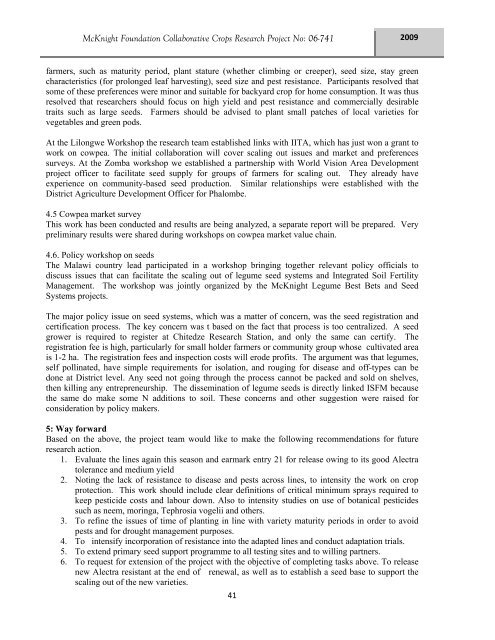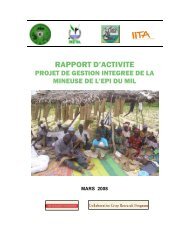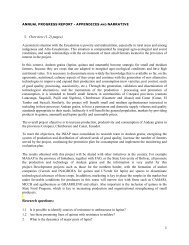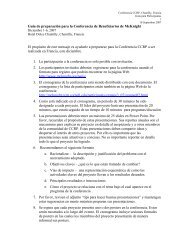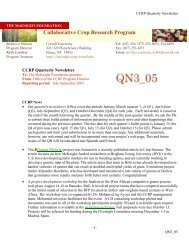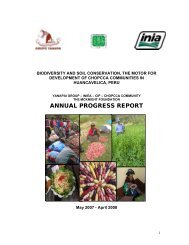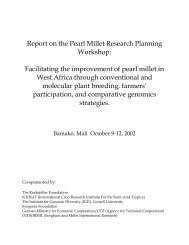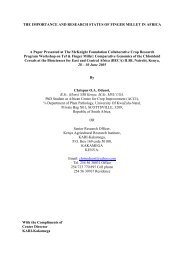English - McKnight Foundation Collaborative Crop Research Program
English - McKnight Foundation Collaborative Crop Research Program
English - McKnight Foundation Collaborative Crop Research Program
You also want an ePaper? Increase the reach of your titles
YUMPU automatically turns print PDFs into web optimized ePapers that Google loves.
<strong>McKnight</strong> <strong>Foundation</strong> <strong>Collaborative</strong> <strong>Crop</strong>s <strong>Research</strong> Project No: 06-741<br />
farmers, such as maturity period, plant stature (whether climbing or creeper), seed size, stay green<br />
characteristics (for prolonged leaf harvesting), seed size and pest resistance. Participants resolved that<br />
some of these preferences were minor and suitable for backyard crop for home consumption. It was thus<br />
resolved that researchers should focus on high yield and pest resistance and commercially desirable<br />
traits such as large seeds. Farmers should be advised to plant small patches of local varieties for<br />
vegetables and green pods.<br />
At the Lilongwe Workshop the research team established links with IITA, which has just won a grant to<br />
work on cowpea. The initial collaboration will cover scaling out issues and market and preferences<br />
surveys. At the Zomba workshop we established a partnership with World Vision Area Development<br />
project officer to facilitate seed supply for groups of farmers for scaling out. They already have<br />
experience on community-based seed production. Similar relationships were established with the<br />
District Agriculture Development Officer for Phalombe.<br />
4.5 Cowpea market survey<br />
This work has been conducted and results are being analyzed, a separate report will be prepared. Very<br />
preliminary results were shared during workshops on cowpea market value chain.<br />
4.6. Policy workshop on seeds<br />
The Malawi country lead participated in a workshop bringing together relevant policy officials to<br />
discuss issues that can facilitate the scaling out of legume seed systems and Integrated Soil Fertility<br />
Management. The workshop was jointly organized by the <strong>McKnight</strong> Legume Best Bets and Seed<br />
Systems projects.<br />
The major policy issue on seed systems, which was a matter of concern, was the seed registration and<br />
certification process. The key concern was t based on the fact that process is too centralized. A seed<br />
grower is required to register at Chitedze <strong>Research</strong> Station, and only the same can certify. The<br />
registration fee is high, particularly for small holder farmers or community group whose cultivated area<br />
is 1-2 ha. The registration fees and inspection costs will erode profits. The argument was that legumes,<br />
self pollinated, have simple requirements for isolation, and rouging for disease and off-types can be<br />
done at District level. Any seed not going through the process cannot be packed and sold on shelves,<br />
then killing any entrepreneurship. The dissemination of legume seeds is directly linked ISFM because<br />
the same do make some N additions to soil. These concerns and other suggestion were raised for<br />
consideration by policy makers.<br />
5: Way forward<br />
Based on the above, the project team would like to make the following recommendations for future<br />
research action.<br />
1. Evaluate the lines again this season and earmark entry 21 for release owing to its good Alectra<br />
tolerance and medium yield<br />
2. Noting the lack of resistance to disease and pests across lines, to intensity the work on crop<br />
protection. This work should include clear definitions of critical minimum sprays required to<br />
keep pesticide costs and labour down. Also to intensity studies on use of botanical pesticides<br />
such as neem, moringa, Tephrosia vogelii and others.<br />
3. To refine the issues of time of planting in line with variety maturity periods in order to avoid<br />
pests and for drought management purposes.<br />
4. To intensify incorporation of resistance into the adapted lines and conduct adaptation trials.<br />
5. To extend primary seed support programme to all testing sites and to willing partners.<br />
6. To request for extension of the project with the objective of completing tasks above. To release<br />
new Alectra resistant at the end of renewal, as well as to establish a seed base to support the<br />
scaling out of the new varieties.<br />
41<br />
2009


